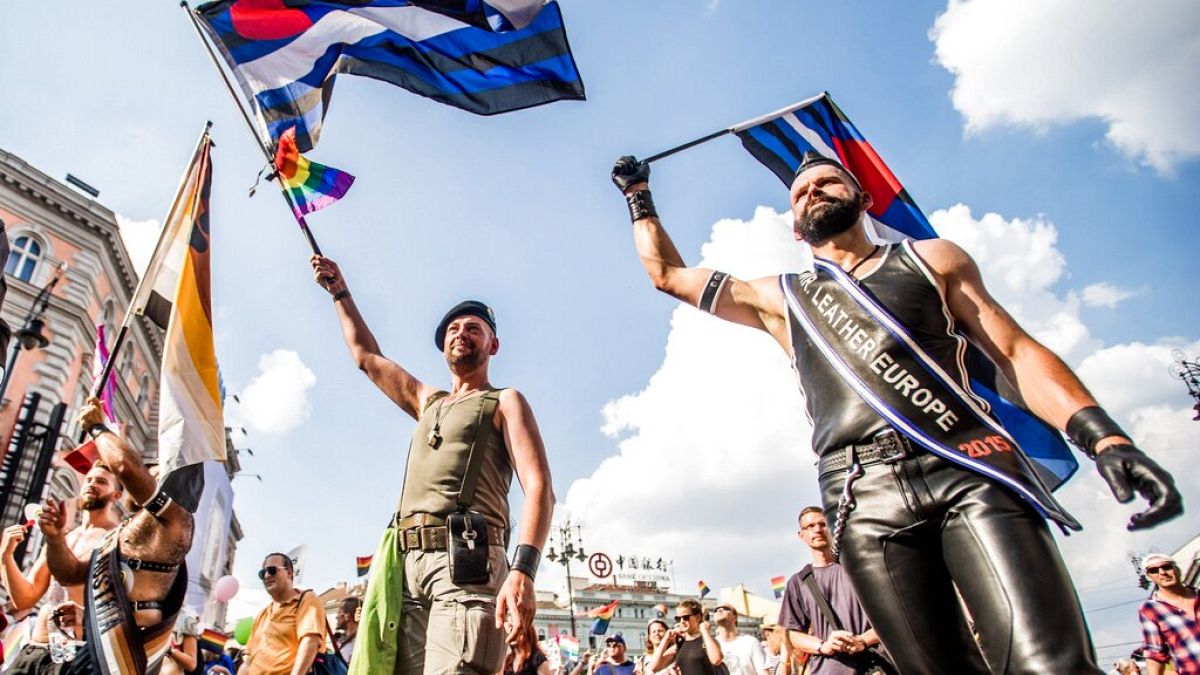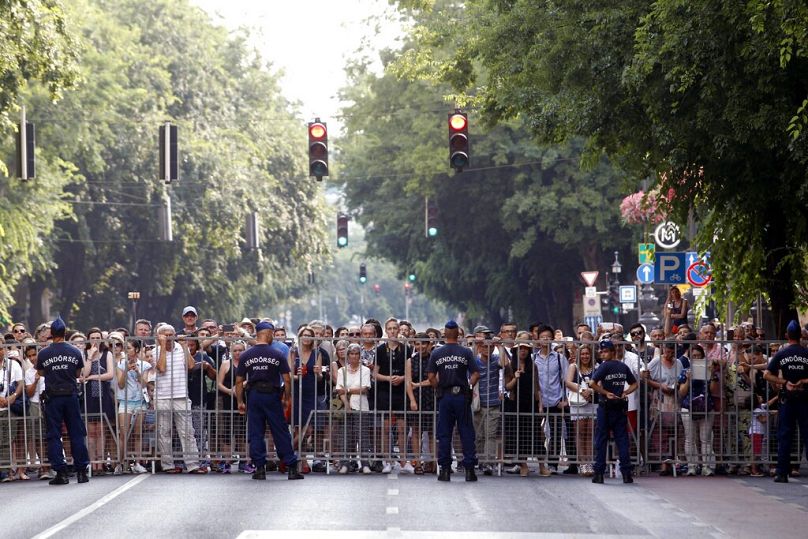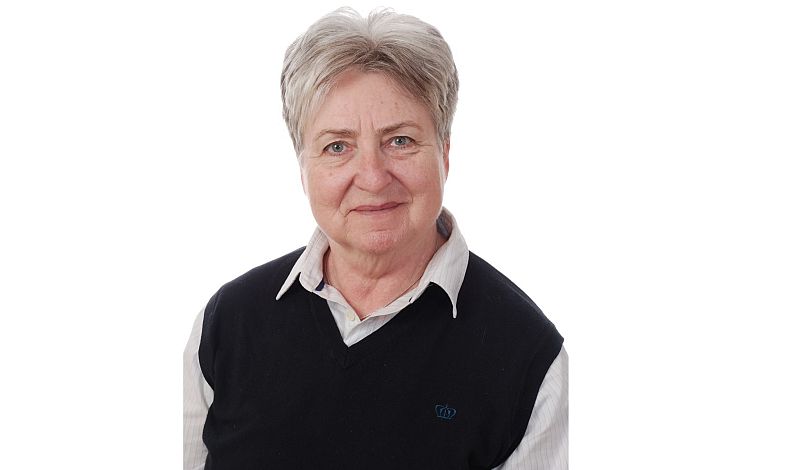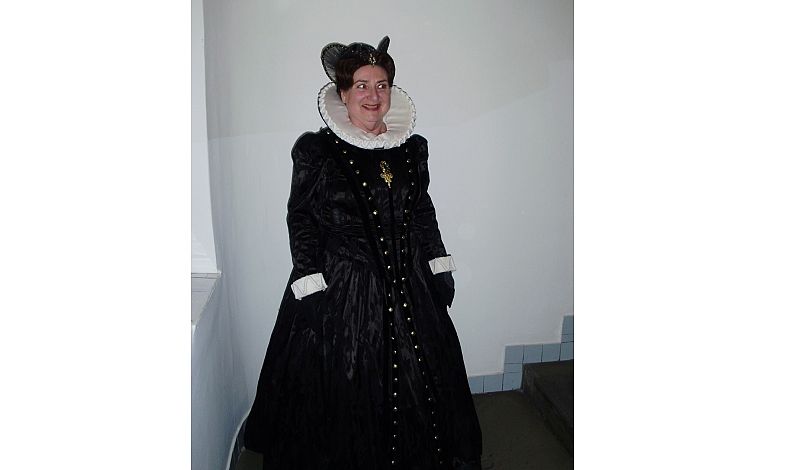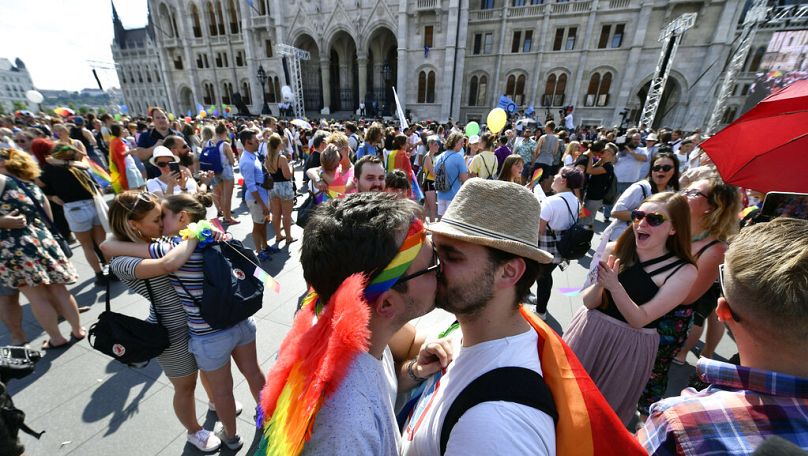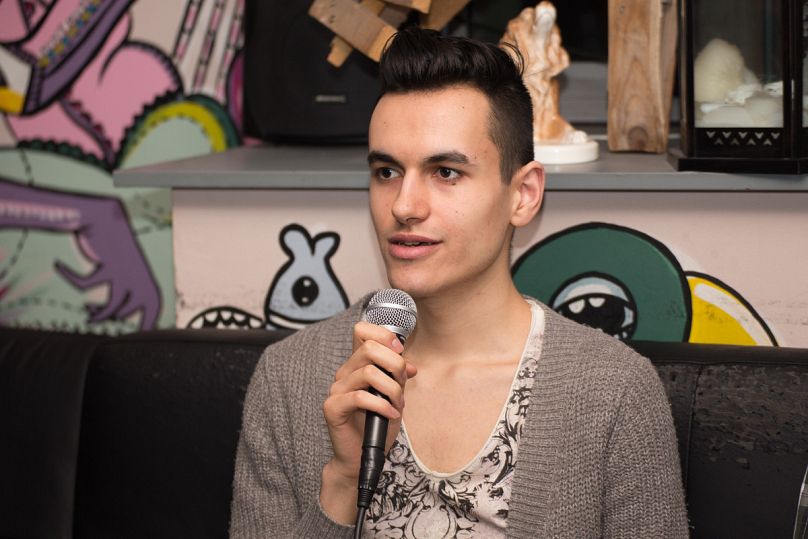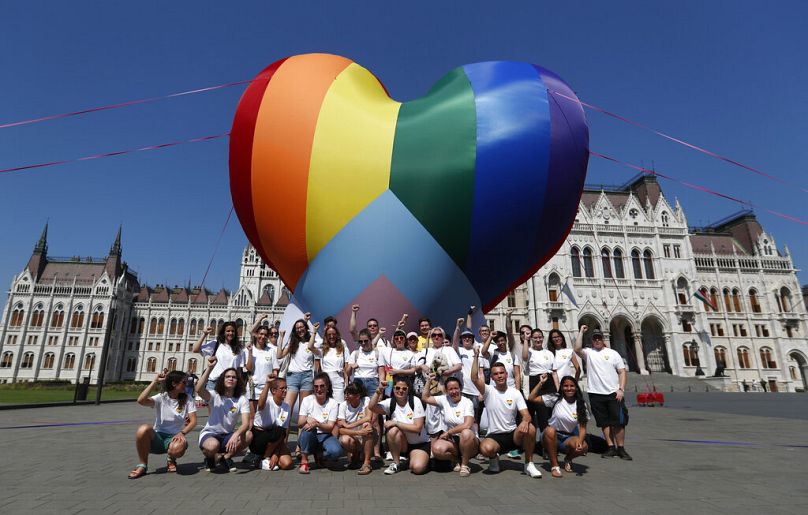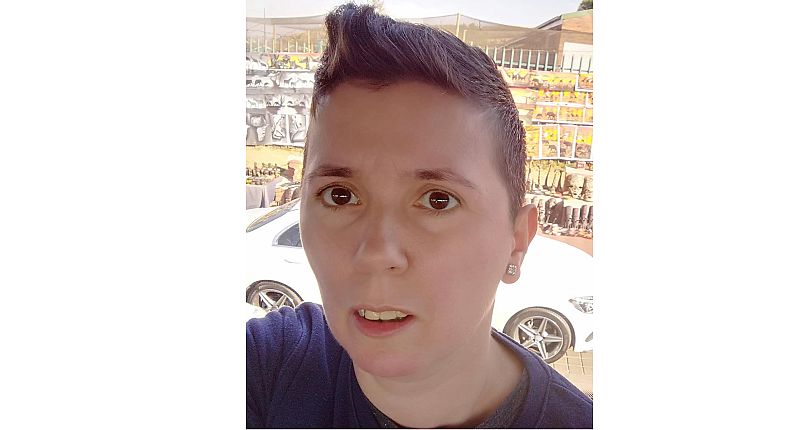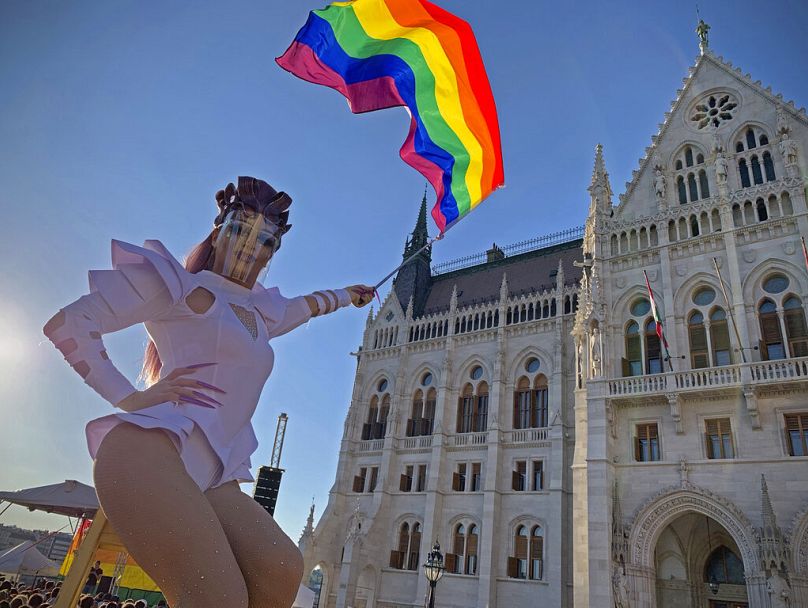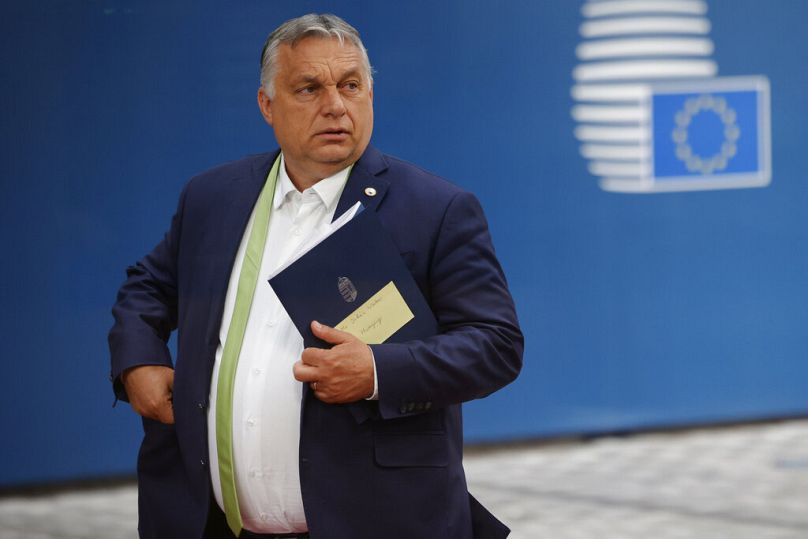Ahead of Budapest Pride this weekend, Euronews spoke to several members of Hungary's LGBT community to find out how a controversial new law had affected them.
On Wednesday, July 7, a widely-contested new law came into force in Hungary. Overnight, it became an offence to "promote" sexual and gender differences to children, in educational settings, films or adverts.
The law’s opacity means it can be applied in a welter of different contexts. It didn’t occur in a vacuum but came against a backdrop of anti-LGBT legislation in Hungary going back 12 months, with the blessing of right-wing prime minister Viktor Orbán.
One of the early casualties of the latest legislation has been a children’s book produced by the Labrisz Lesbian Association, a grassroots network founded in 1999 in Budapest.
Meseorszag Mindenkie, or A Fairy Tale for Everyone, is an anthology of classic fables re-worked to include heroes and heroines from all walks of life, from the LGBT community to single parents.
An initial 1,500 copies of the book were published last September. Then, in January 2021, the government ordered the association to add a disclaimer stating the book depicted “behaviour inconsistent with traditional gender roles”. Since July 7, along with another book by Hungary’s Rainbow Family Association, it has been banned outright.
A member of the Labriz Lesbian Association told Euronews that since these restrictions were imposed, sales of Meseorszag Mindenkie have skyrocketed to 31,500. The ruling had the opposite effect to what was likely intended.
On Saturday, July 24, between 5,000 and 10,000 people are set to take part in the first in-person Budapest Pride march in two years. The annual programme of events in the capital will be more charged than ever this year, 14 months after the government also revoked trans and non-binary people’s right to legally change their gender.
In 2012, ILGA Europe ranked Hungary ninth among 49 European countries on the rights of the LGBT community. By 2019 it had dropped to 19th, and today it ranks at 28th.
The European Union has launched legal action against Hungary linked to the latest law. This week Orban, under pressure from critics of the legislation, promised to hold a referendum on the matter.
In the meantime, Euronews spoke to several people in Hungary to find out what life was like for the LGBT community at the moment.
'I never imagined my being was so dangerous'
Mária Kristófy, known as Kymi, is a retired classical music singer from Budapest who for years toured concert halls across Europe with the Hungarian Radio Choir. For 25 of those years, she was also married to a man.
Now aged 71 and with three grown-up children aged 40, 45 and 47, and with a third grandchild born on Wednesday, Kymi told Euronews that, deep down, she had known from childhood that she was a lesbian.
“When I think back,” she said, “there were signs from age 10. In my teenage years, I fell in love with a boy, but in the meantime, I was dreaming about girls.
“It was never a problem for me. I didn’t mind it. But the problem was what to do about it. This was the 1970s, and there was no information, nothing, about homosexuality. I’d go to the library to look for novels.”
Uncertain about what to do, Kymi married a “very gentle, kind” man at the age of 22 with whom she said she had a “normal marriage” for about six years, after which they cohabited. Gradually, with the help of Hungarian support networks such as the Háttér Society, she gained the confidence to come out to her family at the age of 47.
In her case, the decision was accepted by both her relatives and colleagues in showbusiness – though she concedes that “we did have a lot of gay men in the choir” – and in general, Kymi believes homosexuality was not widely discussed in Hungarian society until recently.
“Now, we see more people out in the open,” she said. “But on the other side, the right-wing is also more and more aggressive.”
The new legislation, which the Hungarian government refers to as a “child protection law”, has come as a shock. “I never imagined my being was so dangerous,” she said. “And for whom? For my kids?
“When this regime came to power they declared they were Christian democrats. They’re not, but they declared it. I think hatred is a tool for them. They’re communicating it more and more simply. The last [round of publicity] were placards with emojis on the streets asking ‘Do you want our children to be sexually educated by LGBT [people]?”
Kymi is a member of the Hungarian LGBT Alliance as well as the Labriz Lesbian Association, on whom the law has had an immediate impact.
The bittersweet success of Meseorszag Mindenkie aside, the association ran an education project for school-age students that came to an immediate standstill.
On Wednesday, the Hungarian government relaxed COVID-19 restrictions on holding referendums in the country. Hours later, Orbán announced the new law would be put to a vote next year, with five questions on LGBT education to be put to the electorate.
Kymi is one of many members of the LGBT community who believe the issues are being used to mask other political tumult in Hungary. At the time the June legislation came into force, Orbán's Fidesz party was facing backlash over proposals - since approved - to donate state-owned land in Budapest to a planned Chinese university.
The referendum was then announced two days after Hungary was accused of using Pegasus spyware to surveil dissidents and journalists. “I think these small problems hide bigger ones," Kymi said. "Now people have to talk about LGBT groups instead of spying.”
'This is a critical time'
Ákos Modolo grew up in a small town in eastern Hungary, close to the Romanian border. Back then, he said, homosexuality was never discussed: “It would have been strange, like saying you were from Mars.”
Boys at his school would drop homophobic slurs, and the local Catholic priest occasionally opined on the “sin” of practising homosexuality. But for Ákos, who accepted at the age of 14 that he was gay, this did not compute.
“I accepted myself very quickly,” he said. “I didn’t feel God didn’t love me; actually, it felt like the opposite. In the Bible Jesus often talks about people who aren’t accepted in their societies. Sometimes in the countryside, I felt quite alone being gay. At those times, I also felt closer to God.”
Eventually, Ákos moved to Budapest at the age of 19. His grandparents only learned he was gay by seeing him on television during a pride march. “It was hard for them to accept,” he said. “But they really love me. I feel I was very lucky.”
Now 27, Ákos is a board member of Szimpozion Egyesület: a community-building NGO with a special focus on young LGBT people in Hungary. Amongst other things, the organisation hosts bi-monthly get-togethers for LGBT young people and runs one of the country’s most popular YouTube channels on LBGT issues.
But until July 2021, it also hosted 30 to 40 interactive workshops a year in schools across Hungary. Volunteers would share their personal stories with up to 1,000 students a year, from elite secondaries through to schools in rural and deprived zones, helping young people become more sensitive to sexual and gender differences.
“A lot of LGBT teenagers feel very alone,” Akos said, “and don’t feel like they’ve found their place in the world. We show them it’s completely fine and you can have a normal life. It’s also important for those students who aren’t LGBT. We also talk about defamation and bullying in a broader sense and show them why it’s important to speak up and show solidarity.
“Since this government came in in 2010 we haven’t received any state funds. Now, we expect we won’t be able to go to high schools anymore.
"The law is very vague and doesn’t say precisely what the punishments are. We’ve talked to teachers and for now, they’re afraid of the consequences [of hosting]; they’re afraid of being fired by the school district director, or of criminal charges. It’s causing self-censorship.”
Akos believes the referendum – like Hungary’s previous, divisive referendum on refugees in 2016 – is intended to “electrify” parts of Orban’s voter base in the run-up to next year’s election, and distract from internal tumult.
It is set to include five politically-charged questions, one of which is: “Do you support that minors may be shown without restrictions media content of a sexual nature capable of influencing their development?”.
In the 2016 migration referendum, a widespread boycott left the result without the necessary 50% quota. But it was still hailed as a victory by the government. The fear is the same will happen this time, and Szimpozion Egyesület is likely to boycott the vote.
In the meantime, Ákos expects to see a good turnout at this year’s Budapest Pride. It comes after huge demonstrations in front of the Hungarian Parliament building over the new law earlier this month.
Politicians of all stripes have also weighed in on the issue. Ákos said he and Szimpozion Egyesület were grateful for the international support, including from the UK, where Prime Minister Boris Johnson was said to have raised "significant" concerns about LGBT rights during a visit by Orbán in May.
Inside Hungary, he said, “Because of the attacks on the community, there’s been a big response from progressives.
“People who didn’t speak before have decided enough is enough. I have gay conservative friends who were very sceptical about activism, but now some have come out on Facebook and are talking to family and friends. Budapest Pride will be more significant than previous years as we’ve never had so much visibility as we do now. This is a critical time.”
'Restructure the EU if needed'
Tina Kolos Orbán, 45, is vice-president of the Transvanilla Association, the only NGO in Hungary with a focus on transgender and gender non-conforming issues.
They came out as non-binary after a long personal journey. In Hungary, they said, "the government was never our friend, but used to leave us alone.
"Now, we've passed so many red lines we couldn't even have imagined before. The turning point was when they took legal gender recognition away [in May 2020]."
The law change wreaked havoc on the lives of many of the people that Transvanilla supports. Hungary no longer allows transgender or intersex people to legally change their gender, and all documentation must match their sex assigned at birth.
What has the practical impact been? Simple: “Not having your gender recognised means whenever you go to the post office to pick up a package, you have to explain yourself.
“If you go to the doctor and they call out your name, you stand up, and the nurse says ‘Oh no, I was calling for a man (or woman) – and you have to tell them and the other 14-odd patients in the waiting room your life story.”
Names in Hungary must also be chosen from a list of pre-approved options, which are divided by sex. Since 2014 transgender people have not been allowed to adopt a new, legal name if it does not correspond to the sex assigned to them at birth. “Some people are having problems buying houses because they don’t match their IDs,” Tina said.
The July law and newly-announced referendum, they assert, is “a distraction. Orban needs an enemy. It used to be migrants but there aren’t any more migrants coming to Hungary now. He tried to make it COVID, but then 30,000 people died in a population of 10 million.
“That attitude is moving downward. Those who were homophobes or transphobes before now feel encouraged. When a government puts forward this type of rhetoric it has an effect on the whole population. It’s really dangerous.”
On July 15, the EU launched infringement procedures against Hungary for alleged violations of five articles of the EU Charter of Fundamental Rights through the law’s enactment, and of two articles with the forced disclaimer added to Meseorszag Mindenkie.
But, Tina points out, when the anti-trans law came into effect last May, the bloc did not step in because EU primary legislation contains no explicit references to gender identity as a protected characteristic.
“We couldn’t ask for infringement procedures then,” they said, “because there was no basis. Even if this little law has to be withdrawn, gender recognition will still be banned in Hungary. Let’s restructure the EU if it’s needed.”
Does the Hungary law harm children's rights?
ILGA Europe is an independent advocacy group promoting the interests of lesbian, gay, bisexual, trans and intersex people across the continent.
The organisation welcomed the EU's announcement of infringement procedures against Hungary on July 15, calling it "a clear message to all member states that they are bound by their membership to respect the core principles of the European Union".
Director of advocacy Katrin Hugendubel told Euronews this was not only a question of EU rules, but of international law, a matter ILGA Europe is working with the Council of Europe to address.
"Most of our discussions have been focusing on the European Union," she said. "But there are also UN treaties and international human rights standards.
"This was presented as a bill to protect children. But from our point of view, it's an attack on the rights of children.
"An unbiased and unstigmatised education, and information about sexual orientation and identity, are an aspect of development and part of the children's rights agenda. It's important for children to have an image of themselves in society if they find out they are LBGTI."
In March this year, Hungary's Constitutional Court officially threw out the ban on legal recognition of gender identity for people who had already changed their gender. New legal procedures are still banned, though, and Hugendubel said the law "remains in place" in practice.
The planned referendum, she said, would make no difference to the legality of the June law. "We are talking about human rights and enshrined principles of non-discrimination. This isn't decided by a majority vote."
Budapest: 'On this issue, we cannot compromise'
The new law is officially called the Child Protection Act: a fact that in itself is upsetting for LGBT people in the country.
Contacted by Euronews for comment, the Hungarian government said: “How Hungarian children are raised is the exclusive right of Hungarian parents. Brussels has no say in this.
“According to every European Union charter document that Hungary has ever adopted, signed and ratified, the upbringing of children is a matter of national competence.
“Yet Brussels is now abusing its power, launching infringement proceedings and threatening to do so because Hungarian law does not allow sexual propaganda in kindergartens, schools, television and advertising.
“It hurts the Brussels bureaucrats that LGBTQ activists are not allowed to get near children. The future of our children is at stake, and therefore, on this issue, we cannot compromise.”
In the statement issued to Euronews, the government pointed out that the Catholic Church in Rome had also pushed back against a law that would have made sex education compulsory, including the admission of LGBTQ activists “even into church schools”.
It added: “This cause is equally a struggle for Central Europe in which it must show that the region’s culture, values and identity are just as much part of the EU as those of Western Europe.
"In the long term, the EU cannot function successfully without the coexistence of the two. The referendum can help us to create child protection regulations within national competence as the people in Hungary see fit.”
Every weekday, Uncovering Europe brings you a European story that goes beyond the headlines. Download the Euronews app to get a daily alert for this and other breaking news notifications. It's available on Apple and Android devices.


